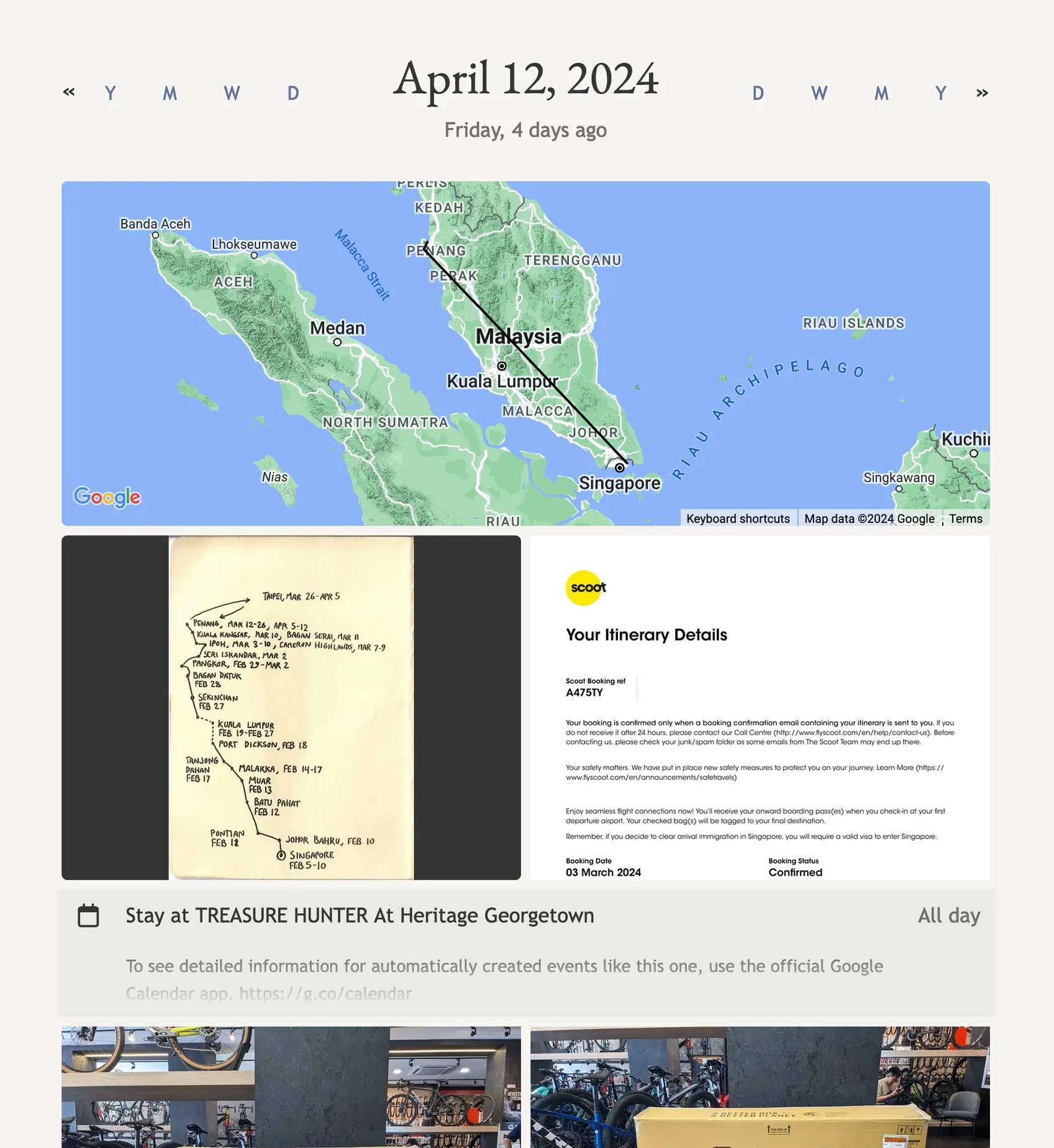Point it at your files, and it generates a timeline of your life. See your photos, videos, calendar events, diary entries, geolocation history, bank transactions and net worth day by day. Scroll through your data the same way you scroll through your photos. The generated timeline is a simple static website.
This project does the same thing as the old timeline, but it's simpler, lighter and easier to run. It's meant to be used by other humans.
Introduction to this project ➞
To install the latest released version, run pip install timeline-ssg.
To install the latest development build, run pip install -e /path/to/this/repository.
Once it's installed, run timeline --help to see how to generate a timeline.
Timeline uses ffmpeg to generate thumbnails and previews for videos. You must install it separately. If you don't install it, video files will not appear on the timeline.
For example, you can run apt install ffmpeg or brew install ffmpeg.
Call timeline /path/to/your/files -o /path/to/generated/timeline to build a timeline. See usage instructions for more details.
The timeline command generates a static website. Use the -o /timeline/output/path argument to choose where to put the files. Look at the logs to see where the files go.
The timeline generates a website. You must serve that website somehow.
There are 3 ways to do this:
- Use the test server (run
timeline -sortimeline -s 8080) to preview the timeline website. This server is not secure, and it's not meant for production. - Use Caddy or nginx to serve your timeline files. You can find an example Caddy config in this repository (
server/server/Caddyfile). - Use Docker. Find a
docker-compose.ymlandDockerfilein this repository (in theserverdirectory).
The docker image needs these environment variables:
SSL_DOMAIN=timeline.johndoe.com
SSL_EMAIL=contact@johndoe.com
WEB_USERNAME=jdoe
WEB_PASSWORD=hunter2
STATIC_SITE_PATH=/timeline/output/path
To generate a timeline from a list of files, call timeline /path/to/your/files. It will be slow the first time, then much faster. Only new or modified files are processed.
Timeline will generate a static website. You can choose the destination with the -o argument. The log show where the generated website is saved.
To serve the website, you should use a static file server like Caddy or Nginx. Timeline can serve the website it generates (by calling timeline -s), but this is a test server. It's neither fast nor secure.
Call timeline --help for full usage instructions.
To display a map of your photos, videos and other entries with geolocation on the timeline, you need a Google Maps API key. If you don't supply an API key, the map will not be displayed.
Use the --maps-key command line argument to supply an API key.
The tool tries to guess the dates and location of files. It uses metadata (like EXIF data on photos), file modification dates, and file names.
If a file name ends with a date, that date will be used:
# Simple dates are supported
/journal-2023-09-10.md
/2023-09-10.md
/test-2023-09-10.journal.md
/2023-09-10.journal.md
# Dates with times are supported
/files/test-2023-09-10T2330.md
/files/2023-09-10T2330.md
/files/test-2023-09-10T2330.journal.md
/files/2023-09-10T2330.journal.md
# Date ranges are supported
/files/test 2023-09-10 to 2023-10-12.md
/files/2023-09-10 to 2023-10-12.md
/files/test 2023-09-10T2330 to 2023-10-12T0504.md
/files/2023-09-10T2330 to 2023-10-12.md
# Date that are not at the end of the name are ignored
/files/2023-09-10T2330 to 2023-09-11T2330 test.md
/files/2023-09-10 to 2023-09-11 test.md
/files/2023-09-10T2330 test.md
/files/2023-09-10 test.md
/files/2023-09 test.md
/files/2023 test.md
# Simple years are ignored
/files/summary 2023.md
/files/2023.md
# Invalid dates are ignored
/files/test-1800-10-01.md
/files/test-9999-10-01.md
/files/test-2023-13-01.md
/files/test-2023-09-1.md
/files/test-2023-9-10.md
/files/test-2023-9.md
/files/2023-09-10T2430.md
Some file extensions hint at files that have a special purpose on the timeline.
*.diary.mdmarks a Markdown file as a diary entry. Those are displayed more prominently on the timeline.*.searches.csvmarks a CSV file as a log of internet searches. It has 3 columns:date(an ISO-8601 datetime),query(the search query) andurl(the optional URL of the search results)*.balances.csvmarks a CSV file as a log of bank account balances. It has 3 columns:date(aYYYY-MM-DDdate),account(the name of the account) andbalance(the balance of the account at that time)*.n26.csvmarks a CSV file as an N26 bank transaction export. Each line will be added to the timeline as a bank transaction.*.kontist.csvmarks a CSV file as an Kontist bank transaction export. Each line will be added to the timeline as a bank transaction.*.degiro.csvmarks a CSV file as a Degiro transaction export. Each line will be added to the timeline as a transaction.
